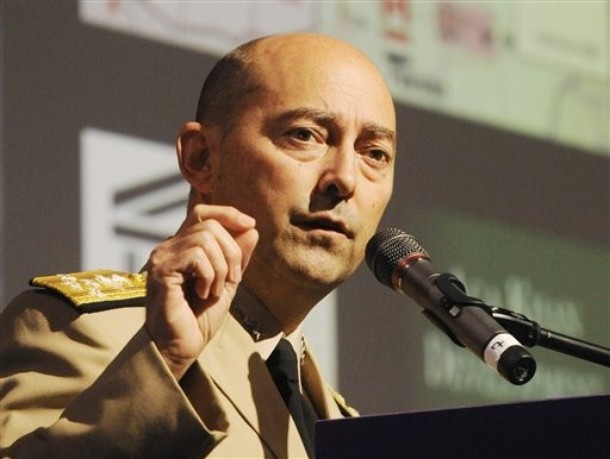
From James Stavridis, EUCOM: Not surprisingly, I’ve received a lot of questions about what is happening in Libya in both my capacity as Commander of the US European Command (USEUCOM) and as the Supreme Allied Commander, Europe (SACEUR).
Given the amount of interest, let me address the role of both USEUCOM and Allied Command Operations (ACO) in Libya – the former in a supporting role, the latter acting upon direction from the North Atlantic Council (NAC). …
The Combatant Command with the lead role in ongoing US military operations in Libya – titled Operation ODYSSEY DAWN – is the United States Africa Command (USAFRICOM), under the very able leadership of GEN Carter Ham. USEUCOM is involved in support of USAFRICOM. …
To be more precise, some of the ways USEUCOM is providing support include manpower augmentation (e.g., intelligence, operations, public affairs, etc.), contingency planning, communications connectivity and infrastructure, logistical support at bases within the European theater, and basing/overflight rights. Overall, USEUCOM has helped to enable the effective execution of the operation in a complex and dynamic environment; however, USAFRICOM is the lead combatant command capably directing forces in support of Operation ODYSSEY DAWN. …
On March 22, NATO Secretary General Anders Fogh Rasmussen announced the NAC’s agreement to enforce the UN-mandated arms embargo on Libya within the context of UNSCRs 1970 and 1973. NATO operations for Libya have been named Operation UNIFIED PROTECTOR. Under the scope of UNIFIED PROTECTOR, NATO is authorized to enforce the arms embargo and the no-fly-zone (NFZ). This was just five days after the UNSCR passed. …
As for the NFZ, it was originally initiated by a coalition of primarily NATO countries coordinating under Operation ODYSSEY DAWN. It quickly became apparent that NATO is uniquely qualified to assume leadership of the NFZ, bringing both capabilities through its members’ military commitments and coherence through NATO’s well established command and control structure. As we have seen in Kosovo, Afghanistan, operations supporting counter-piracy and other missions, NATO has the experience and expertise to lead this effort. On March 24, the NAC took the next step to approve enforcement of the NFZ, which puts NATO in that leadership role, just seven days after the UNSCR.
And finally, just last night, NATO Allies decided to take on the whole military operation in Libya, ten days after the UNSCR. As defined by the United Nations Security Council Resolution, our goal is to protect civilians and civilian-populated areas under threat of attack. NATO will implement all aspects of the UN Resolution.
The bottom line is that in both cases – on the US side and within NATO – we are seeking to protect innocent lives and allow Libyans the freedom to decide the future of their country. Important work, indeed.
Adm. James Stavridis, Commander, U.S. European Command and Supreme Allied Commander, Europe. (photo: AP)
Image: ap%202%2017%2011%20Adm%20James%20Stavridis.jpg
